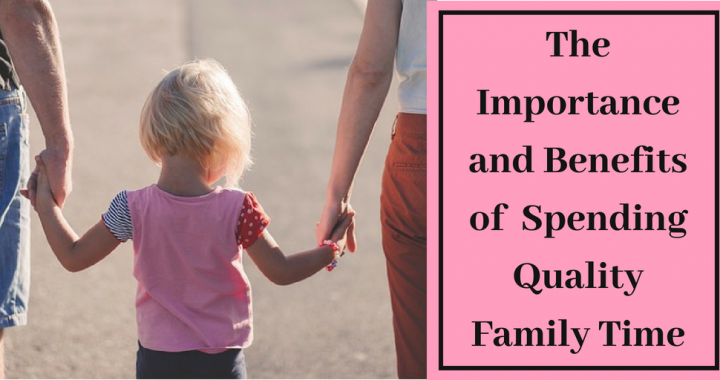Let me ask you a question about quality family time:
How much quality family time did you spend yesterday, last week, last month?
Can you answer in days, hours or is it just minutes?
And here’s a more important question:
How does that make you feel?
This article discusses the importance and benefits of spending quality time with your family and suggests ways that you could increase this to benefit not only your own life, but those of the people you love and care about most.
With many families now having both parents that work, and the increase in single-parent families, it is more important than ever that families spend quality time together.
So read on to find out why this is important and how you can do it more.

Spending quality time with your family is important
I think it is fair to say that on many levels I come from what many would call a “dysfunctional family”. If you look at some of the facts about my family, you can see why I say that:
- I come from what some call a ‘broken home’ – my parents split up when I was in my teens
- history of mental health issues with some close members of my family
- my father was an alcoholic who had a stroke aged 49 and later died in his early 60s
- large disparity of incomes and standard of living within close family circle
- immediate family members had physical disability issues
- I have personally long-term fostered 2 children who have some challenges related to their own traumatic family history
- At the time of writing, I am a single-carer who works 2 jobs.
One or two of the above criteria might be enough to send any family off the rails but to cope with all of them in one family, might be considered a ‘miracle’ too by some.
I just call them my family and I love each and every one!

My family at a recent festival
In reality, I suspect that ALL families have their fair share of issues like the ones mentioned above. Some have more traumatic things to deal with and some have less, but the great thing about our family is that no matter what we face, we can always do it together and we can always come out of diversity, stronger than we went into it.
That does not mean that we do not have our problems: we do. And we have many deep-rooted problems that we are continually working through that are rooted in our childhood, my parents’ relationship, the way we were brought up and everything in between.
My sisters are like chalk and cheese – they argue, stop talking to one another and then find a way through it to bring themselves back into the fold. This is what we call “normal” in our family.
What we do have though is strong family bonds which can withstand adversity and overcome challenges. Whatever we encounter, we have experiences that we can draw on as a family that help us through and keep us communicating
I believe that the it is not just a coincidence but it has been developed by my parents spending quality family time with us and our family sharing many experiences both good and bad. Birthdays and festivals are celebrated, weekends are used for going out, and we enjoyed many family holidays together, mostly at home as a ‘staycation’ but we did things and played together a lot. In short, we had lots of good old-fashioned quality family time.
 Importance of Quality Family Time
Importance of Quality Family Time
In the last 60 years, much research has gone into parent-child relationships and how these relationships affect the psychology and behaviour of children as they grow up, pass through the teenage years and grow into adults.
Several theories such as the social learning theory, attachment theory and ideas about different parenting styles have shed light on these relationships and shaped both social care and recommended parenting advice.
There are many benefits of spending quality time with children, whether as a parent, aunt, uncle, grandparent, carer or foster carer. I myself have been a foster carer and have seen first-hand the challenges children face when they develop attachment issues due to neglect or lack of positive and meaningful relationships with their primary carer.
Benefits of quality family time include:
There are a number of benefits to spending quality time with your family which include:
- Greater understanding of each other
- Improved communication
- Better levels of trust
- Improved social skills – children interacting with adults and vice versa
- Sharing quality experiences
- Reductions in high-risk health behaviours (such as smoking, drug and alcohol abuse)
- Greater ability to work through problems together
- Appreciation of each other as individuals and family members
- Improved self-esteem and concepts of identity
- Reduced behavioural issues
- Enhanced feelings of belonging and attachement
- Better achievement in school
- More FUN!
(See reference list below for more information)

Improve Your Family Time
Improving family time does not necessarily have to be about spending more time with your family although that would depend on how much time you are making for them to start with. Everyone’s life needs balance which means you also need time for:
- your partner
- your career
- your friends
- yourself
in order to get a good work-life balance.
 Make Sure You Are In The Right Place Emotionally
Make Sure You Are In The Right Place Emotionally
I often see people who are extremely dedicated to their family but who allow their children to rule the roost, so they end up running around from pillar to post spending every spare minute keeping their children ‘happy’.
What happens here though is the parents get burn-out and find themselves resenting the time they spend with their children because they have no time left for themselves or the things that are important to them.
The next thing that happens is that the time they do spend with their children becomes very fraught as the parents’ stress level rises and there are more arguments and the time is definitely not quality time.
It is therefore important that you are in a good place with yourself if you want to spend quality time with your family.
If you are stressed from work, then you need to address this first before you play with your kids because they are not stupid: they are highly-receptive emotional beings and they will pick up on your moods and stress very quickly.
The problem with this is that despite this, they will not usually have the emotional intelligence as children to understand the reasons for your stress and more often than not, will blame themselves for your bad mood and come to conclusions that are simply not true – for example, about you not wanting to be with them, or not loving them enough.
Therefore you need to be in the right place emotionally to spend time with your children.
 Think of your own life and upbringing.
Think of your own life and upbringing.
- Were there times that you felt your parents or carers were not in the right place emotionally to play with you?
- How did that make you feel?
- What conclusions did you draw?
Making sure that YOU are in the right mindset for family time is crucial to the success of it. That might mean that you reassess your schedule and factor in spending time with your children into your daily or weekly list of ‘things to do’. Then you can approach it with the right mindset and your time will be much more productive and beneficial to all involved, especially your children.
If you are struggling with scheduling any family time at all, then you might need to readdress your priorities, take some time out and look at the stresses in your life. Techniques such as mindfulness, meditation, tapping and life coaching could help you to sort through the situation.
What Can You Do To Improve Your Family Time
There are many ways you can easily improve your family time, not just in terms of time but in terms of quality. Here are just a few ways you could explore:
1. Meal Times
We all need to eat but there is a trend nowadays for everyone to grab something from the fridge and eat in their own time, especially if you have teenagers. One way you can improve family time is to set aside a few meals a week when you all sit down to a scheduled meal. It doesn’t have to be every day although it could be, but this will allow people to come together and share their day or week with others.
Other things you can do is to include children in the decisions, such as menu planning, shopping, cooking, setting and clearing the table. This will teach them the responsibilities of planning meals as well as making them feel more involved.
And you never know; eating meals laid out in the shape of ‘funny faces’ might be just the tonic your looking for to counter that busy-day at work!

2. Find Some Hobbies You All Like
It’s true that hobbies tend to run in families so if you dad liked fishing, then you’re probably more likely to like fishing too. My children and I love dance and the performing arts, so we always sing together in the house and in the car, and if you come round to our house, you may be subjected to an impromptu performance.
As a child, I remember helping my dad to fix his cars and so changing a tyre and doing simple maintenance on my car always reminds me of him.
Whatever your own hobby is, you can probably share it with your kids as long as it’s legal, safe and not immoral to do so.
3. Play or Watch Sports Together
If you love watching football, why not explain it to your children. My brother-in-law plays lots of tennis and my nephew does too now. It’s something they share together and can talk about at length.
I really like watching athletics so when the Olympics came to the UK, we managed to get tickets to see some athletics and we all went up as a family to the new Olympic park. It was great fun.
My girls love to go swimming and that is something we do quite regularly. It’s actually great fun and as they get older and can swim independently, I get time for a bit of keep-fit too. I don’t do the water slides, but they do, but we all go around the lazy river, play sharks, mermaids or just swim. Perfect!

4. Days Out
We absolutely LOVE our days out as a family. Sometimes it is just the girls and I, sometimes we go with my mum, or my sisters and their families, and quite often it is all of us and we all head out together for a family trip to the seaside, National Trust property, on a walk, to a museum or other festival.
Just this weekend we have a great day out visiting some Northamptonshire tourist attractions, taking picnics and just milling around.
Some examples could be:
- Theatre shows or concert
- Local town or village events
- Country houses
- Historical places
- Craft Fairs
- Country Shows
- Trips to a local market or town
- Walking or hiking
- Beaches and countryside
- Adventure parks
- Festivals or all sorts (music, arts, food, crafts, performing arts)
You should be able to find a lot of things listed online in your local “What’s On?” guides.
These things do not need to cost a lot of money either as there are many free or low-entry things on every day. You can also take a picnic to enjoy, saving money on meals too.

5. Go to the park
There are a lot of parks where I live and the standard of the playground equipment is amazing compared to when I was a girl. Back then it was the swings, a see-saw, slide and a roundabout if you were lucky. Nowadays there are zip wires, climbing frames in every conceivable shape, trampolines, sandpits, witch’s hats, tunnels, balance beams and many more too.
Luckily for me there’s also usually a coffee shop so I can get my usual latte after pushing the girls on the swings for half an hour. And we all love to get into the big circular swing, lie back and relax watching the clouds for a while to recover too.
If there is no playground then you can play ball games such as football, catch, cricket, or we like to take some other things such as lawn bowls, boules or one we all like, Viking chess! All good outdoor games that can be enjoyed on a sunny afternoon with a picnic in the park.
6. Board Games or family games
Board games were great fun in my family and I still play them with my family today. We like to play the old traditional ones such as Monopoly, Twister or Risk (see my posts on classic board games and classic family games for some more ideas).
Make sure that everyone is not over-competitive however as this could lead to arguments which is not the idea of quality family time.
7. School events and performances
School performances and events are a great way to increase your family time and we’ve all seen the films where one parent never makes the school shows for this reason and that reason, dashing the child’s hopes and dreams. Sometimes it is impossible to make school events if they are run when you need to be at work, but it is prudent to make every effort possible if you can.
And remember, when you see your little person after a school performance, they are really keen to know that you thought they did well and that you are proud of them, so make sure that your first words are always positive and encouraging as these are the ones they will remember most.
It’s not always necessary to give them your best and honest review of the production, worthy of a write up in The Times; they just want to know that you love them and you think they did well.
That doesn’t mean you have to lie if the whole thing was terrible, but try to find all the good and positive things you can before you launch into your “you can do much better next time” speech. Put yourself in their shoes for a bit or remember how you felt when you ran up to your own parents after a school play. What do you remember about what they said, and what did you take from that encounter?

8. Reading and homework
Now I freely admit that helping with homework can sometimes be a double-edged sword, especially in my family. My daughter’s love it when I read to them and sit, helping them with their homework, but I’m also very aware that there is a point, beyond which I do not go. I want my children to enjoy school, to love learning and to become lifelong learners and I encourage that in everything we do.
And in my book, that does not just mean spellings, reading and maths, as so many schools emphasize. I know this is a bit of a ‘soap box’ topic of mine, but I truly believe we should be educating and encouraging the whole person and teaching in an holistic way, recognising and celebrating individuality and the diversity of likes and dislikes that we all have.
So I’m just as happy watching a program about architecture around the world with my 10-year old, or discussing the different political systems around the world as I am just focusing on maths and spellings. And I know I am at odds with their primary school teachers on this at times.
However, if you are trying to encourage better quality family time, then I think you should be aware that there is often a fine line between helping with homework and piling on extra stress and pressure. One is beneficial and the other is not, so make sure that if you are increasing your quality family time by helping with homework, that you do that without coming across like the scariest headmistress or headmaster they could possibly have.
9. Religious festivals
I am not a particularly religious person but I am a very spiritual person. And as such, I can also appreciate the festivals and celebrations of many of the world’s many religions. As we live in the UK, we tend to celebrate Christmas and Easter although we always have discussions about what is being celebrated and why.
In the same way though, we will celebrate May Day as Beltane and Halloween as Samhain in the pagan tradition, as well as Chinese New Year, Burns Day, Saints’ days and the Summer and Winter Solstice. I’m sure as my girls get older, we will celebrate or attend others as well.
I find these are great ways to celebrate the rich diversity of life and beliefs on the planet: respecting and trying to understand other people’s beliefs and I think it is important and fun teaching my children the values of tolerance, respect for others, and understanding as we go.
 10. Shopping
10. Shopping
This could be a curse or a blessing and again, it really depends on your ‘parental mindset’ as you go into the shopping mode as to which it becomes for you. What I mean here is that you need to be in the correct frame of mind to make ‘shopping’ a way to increase quality family time.
If you need to run round the supermarket in 10 minutes before the shop shuts or your car park runs out, then taking the children with you is probably a no-no in terms of quality family time.
If you have more time though and can go round in a more leisurely pace, looking at the nutritional value of things and comparing prices, and explaining differences between things, then it becomes a much more fun thing to do.
This also depends on the age of your children obviously but as my girls grew up, they enjoyed searching for things and pushing the trolley. (Be careful with that one though as sometimes they get distracted!)
If you have toddlers, then you can make it a game, or a quiz for older children. Try to make it fun and involve them and your shopping journeys will be better.
So there you have it, some ways to help improve your quality family time. None of it is rocket science if you just:
- make sure you are in the right mindset
- encourage and involve your children
- remember to make things fun.
Wishing you all the very best quality time with your families.
Please share or leave a comment below.
Gail
For more information on research into the benefits of quality family time, see:
Anderson SE1, Gooze RA, Lemeshow S, Whitaker RC. Pediatrics. 2012 Jan;129(1):132-40. doi: 10.1542/peds.2011-0972. Epub 2011 Dec 26.
Cooksey, E.; Fondell, M., Spending Time with His Kids: Effects of Family Structure on Fathers’ and Children’s Lives, Journal of Marriage and the Family, v58 n3 p693-707 Aug 1996
Duncan, S. and Brown, G. (1992). RENEW: a program for building remarried family strengths. Families in Society, 73(3), 149-158.
Luster, T; Bates, L; Vandenbelt, M; Nievar, A, Family Advocates’ Perspectives on the Early Academic Success of Children Born to Low-Income Adolescent Mothers, Family Relations, v53 n1 p68-77 Jan 2004
Luster et al., “Family Advocates’ Perspectives on the Early Academic Success of Children Born to Low-Income Adolescent Mothers,” Family Relations 53, No. 1 (January 2004): 68-77.
O’Connor, T and Scott, S. Parenting and Outcomes For Children. Joseph Rowntree Foundation. Kings College, London. 2007. ISBN: 978 1 85935 600 5
Pearce, M. “The Protective Effects of Religiousness and Parent Involvement on the Development of Conduct Problems Among Youth Exposed to Violence,” Child Development 74, No. 6 (November/December 2003): 1682-1696
Ramon, B. Zabriskie, B. McCormick, The Influences of Family Leisure Patterns on Perceptions of Family Functioning, Family Relations Volume 50, Issue 3, pages 281–289, July 2001
Robinson, L. and Blanton, P. (1993). Marital strengths in enduring marriages. Family Relations, 42(1), 38-45.
Rupured, M. and Quick, S. (1989). Family vitality: characteristics of strong families. Publication H.E. 7-138, University of Kentucky Cooperative Extension Service.
Stinnett, N. and DeFrain, J. (1985). Secrets of strong families. Boston: Little, Brown and Company.
RELATED POSTS
Fun kids games, remember these?
Fun activities for a rainy day: classic board games





Hi Gail, and what an awesome post… I’m certainly going to read it again today. And my eyes almost popped out of my head when I read you spent a “day out visiting some Northamptonshire tourist attractions” I live in Northampton Town myself!
Anyhooow
I totally am in alignment with your your thoughts, and it’s true, we all have issues with family in some ‘dysfunctional’ way – I love your examples of activities that really do double as great family time moments.
I’ll certainly be back – thanks for sharing, you’ve put a spark to my kindling.
Tony B
Hi Tony. What a small world it is. Northampton is my home town although I now live in Surrey but visit there regularly. I’m glad you found the post useful and great that you can use some of the suggestions with your own family. Great stuff. Give my love to the Derngate and Abington Park! 🙂
A great post Gail. I loved the depth you went to and it really opened my mind that i need to have a little bit more family time. Thanks
Hi Leah. Glad that you liked the post and I do try to write information that will help people. Family time is so important and I think it is always worth pointing this out, but especially as there is so much digital interactions now in place of real face to face ones. 🙂
Amazing post Gail thank you so much. As a husband and a dad to 3 daughters family time is important and this is a must read for all. Again thank you so much.
Hi David. Thanks for reading and taking time to leave a comment. So glad that you found the post useful. Being a dad is a great thing and 3 daughters keep you on your toes I’m sure. I was the middle one of 3 girls too and I felt for my poor dad sometimes being the only man in a house full of women! I’m sure you cope very well and wish you all the best in finding your own family time. Gail
Your advice for parents to share their hobbies with their kids, such as fishing or car maintenance is a good idea. This would be a great way to teach them useful skills for when they’re older while also spending quality time getting to know each other. When choosing what to do, it could help to think about what activities are in the area so you can figure out what you’ll all enjoy as well as what can be a useful lesson to improve their skills.
Hi Tiffany. Many thanks for your comments and I’m glad we are on the same page when it comes to thinking that spending time with children is important. I agree that looking at your local ‘what’s on’ guide is a great way to find interesting and new activities too. I recently did just that and we all ended up at the local archery club as they were having and open day. It was great fun.